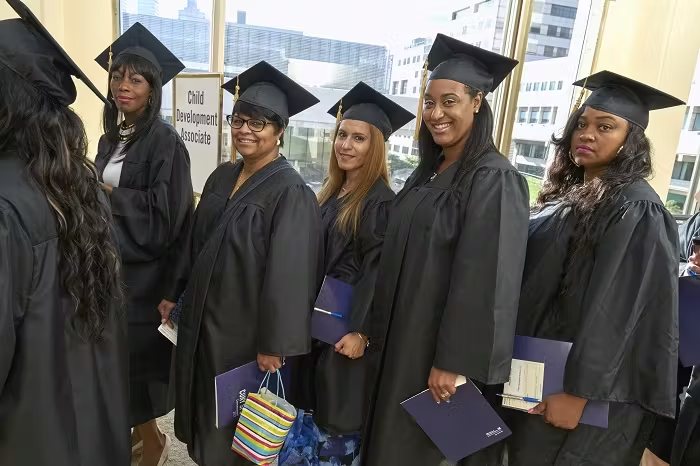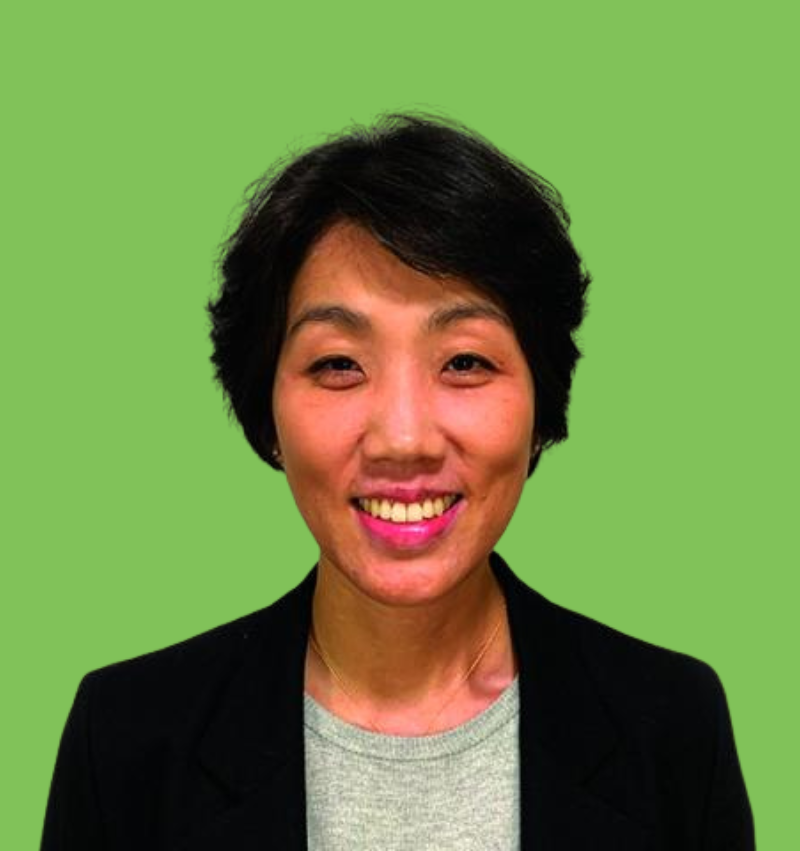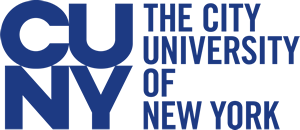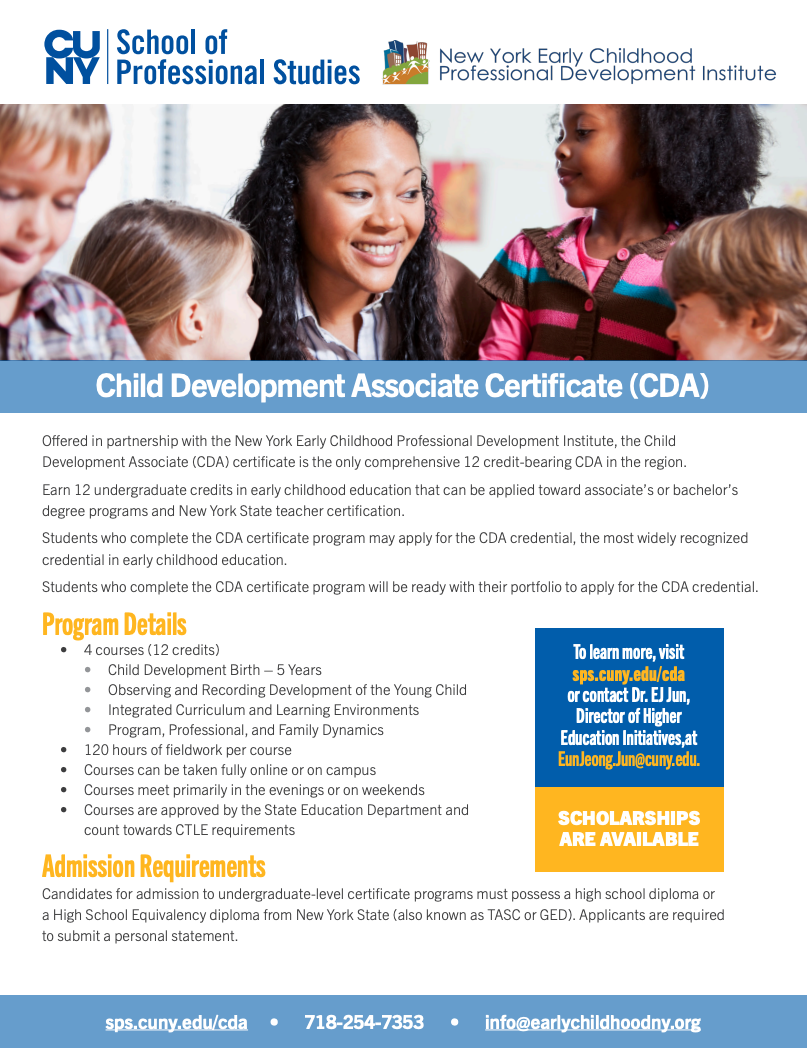Child Development Associate (CDA) Certificate
The Child Development Associate (CDA) credential, issued by the Council for Professional Recognition, is a nationally recognized credential that is widely accepted as a minimum requirement for working in many early childhood centers.
The CDA certificate program at the CUNY School of Professional Studies, offered in partnership with the Institute's Career Development Center, prepares anyone interested in working with infants, toddlers and preschool-aged children (birth through age 5) to seek their CDA credential.

Overview
In this 12-credit program, students learn the skills they need to create an effective learning environment for children. Students take four required courses and receive guidance with writing, creating a portfolio, classroom observations, career services and more. The program admits students three times a year (in the spring, summer, and fall).
Students who complete the requirements of these credit-bearing courses, with faculty advisement, can go on to submit a portfolio to the Council for Professional Recognition in order to earn the CDA credential.
Credits earned in the CDA certificate program may be transferred to several other CUNY and SUNY colleges toward an associate's or bachelor's degree. They also count toward Continuing Teacher and Leader Education (CTLE) hours.
Courses in the CDA program are offered in both English and Spanish. Learn more about the Spanish CDA.
Questions about the CDA?
Learn more about the CDA certificate program at the CUNY School of Professional Studies:
Make an appointment with E.J.

E.J. Jun
Director of Higher Education Initiatives

E.J. Jun
Director of Higher Education Initiatives| Day | Hours | Notes |
|---|---|---|
| Monday |
9 AM - 5 PM
|
|
| Tuesday |
9 AM - 5 PM
|
|
| Wednesday |
9 AM - 5 PM
|
|
| Thursday |
9 AM - 5 PM
|
|
| Friday |
9 AM - 5 PM
|
|
| Saturday | - | |
| Sunday | - |
- Rescheduling, cancellations and missed appointments: If you need to reschedule or cancel your appointment, please do so by going into your calendar and following the links to either cancel or reschedule. If you miss three appointments without giving your advisor prior notice, you'll no longer have access to the Acuity scheduling system. You'll need to request an appointment by emailing your advisor, who will determine availability based on their schedule.
- Please do not book more than one time slot for your appointment, which limits availability for other clients. "Holding" multiple time slots may result in your appointment being canceled or your email being blocked from the Acuity Scheduling system.
- Reprogramación, cancelaciones y citas perdidas: Si necesita reprogramar o cancelar su cita, hágalo ingresando a su calendario y siguiendo los enlaces para cancelar o reprogramar. Si falta a tres citas sin avisar previamente a su asesor, ya no tendrá acceso al sistema de programación Acuity. Deberá solicitar una cita enviando un correo electrónico a su asesor, quien determinará la disponibilidad según su horario.
- Por favor no reserve más de un horario para su cita, ya que limita la disponibilidad para otros clientes. "Reservar" múltiples horarios puede resultar en la cancelación de su cita o el bloqueo de su correo electrónico en el sistema de programación Acuity.
Students in the program will:
Fieldwork
A vital source of evidence of a student's skills is actual hands-on work as a teacher with children and families, which also provides a student with an opportunity to learn through experience. Fieldwork offers students an opportunity to see their practice in light of new knowledge from the CDA coursework.
Students are expected to complete 120 hours of fieldwork per course at a licensed child care program, regardless of whether they intend to pursue the CDA credential. In the last course (EDUC 203), fieldwork will be observed by an assigned fieldwork observer.
Students currently employed by a licensed program serving children birth – 5 years can use their place of employment for their fieldwork hours. Students who are not employed by a licensed program will be placed in a site that is agreed upon by the instructor and student. Students are expected to complete 480 hours of fieldwork prior to completion of the certificate program.
CDA information sessions
2026 CUNY SPS CDA Info Session
The series runs from February 17, 2026 to December 31, 2026
Frequently Asked Questions
Participants must take the four courses, each worth three credits, in succession:
- EDUC 200 - Child Development Birth - 5 Years (3 Credits)
- EDUC 201 - Observing and Recording Development of the Young Child (3 Credits)
- EDUC 202 - Integrated Curriculum & Learning Environments (3 Credits)
- EDUC 203 - Program, Professional, and Family Dynamics (3 Credits)
We offer three different modalities: virtual, hybrid, and on-campus. On-campus classes are typically held in midtown Manhattan at the SPS campus located at 119 West 31st St. You will have the option of taking weekday evening classes or weekend classes.
In addition to coursework, students are required to complete 120 hours of supervised fieldwork per course (480 hours total), regardless of whether they intend to pursue the CDA credential.
Students currently employed by a licensed program serving children Birth – 5 years can use their place of employment for their fieldwork hours specific to their CDA designation (infant/toddler, preschool or family child care). Students who are not employed by a licensed program will be placed in a site that is agreed upon by the instructor and student. Students are required to complete 480 hours of fieldwork prior to completion of the certificate program.
Visit the CUNY School of Professional Studies to view current tuition rates. The majority of our students receive some form of scholarship. Students who apply for The Enhanced NYS B5 SUNY-CUNY Workforce Scholarship: Early Childhood will be able to meet with a career advisor, who will review your eligibility for all of the scholarships. To learn about some of the scholarships available for early childhood professionals, please go here.
Articulation agreements are formal agreements between CUNY SPS and two-year and four-year colleges and universities, allowing students to transfer the maximum number of credits with ease. Currently, seven CUNY and SUNY schools accept CUNY SPS CDA credits for transfer:
- Borough of Manhattan Community College (A.S.)
- Hostos Community College (A.A.S.)
- Kingsborough Community College (A.S.)
- LaGuardia Community College (A.A.)
- Medgar Evers College (A.A. & B.A.)
- CUNY School of Professional Studies (B.A. in Youth Studies Program)
- SUNY Empire State College (A.A. & B.A.)
Training:
- Complete 480 hours of professional work experience working with children (specific to the CDA designation – Infant/Toddler, Preschool, Family Child Care, or Home Visitor)
- Complete 120 clock hours of formal education/coursework.
- As part of their SPS coursework, students compile a Professional Portfolio that is used for the final assessment process. In addition to the Professional Portfolio, students demonstrate their competence through a Verification Visit and CDA exam.
- After the Council for Professional Recognition receives the scores for both your Verification Visit and CDA exam, the Council creates a Cumulative Score in order to determine your final credentialing decision. The Cumulative Score takes into account your understanding of the six CDA Competency Standards and 13 Functional Areas and your ability to put them into practice. There is not a passing or failing score on either the CDA exam or the Verification Visit. Instead, the Council comprehensively evaluates how you score in each of the Functional Areas during the Verification Visit and on the CDA exam to arrive at its decision.
- A CDA credential is valid for three years from the date of the award. You can apply to renew your CDA credential 90 days before it expires.
Contact
If you have any questions, please contact us:
CDA Completion Program
Want to learn more about the CDA Completion Program?
If you have already earned your CDA certificate and need support preparing to apply for your CDA credential, learn more about the CDA Completion Program.
Apply Now

